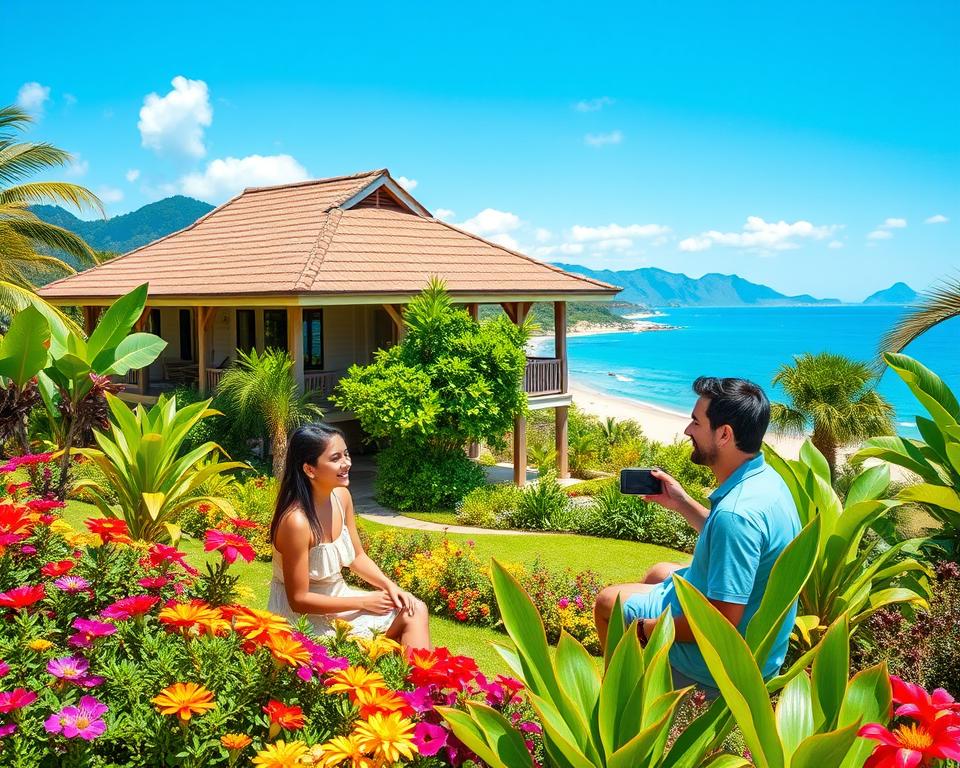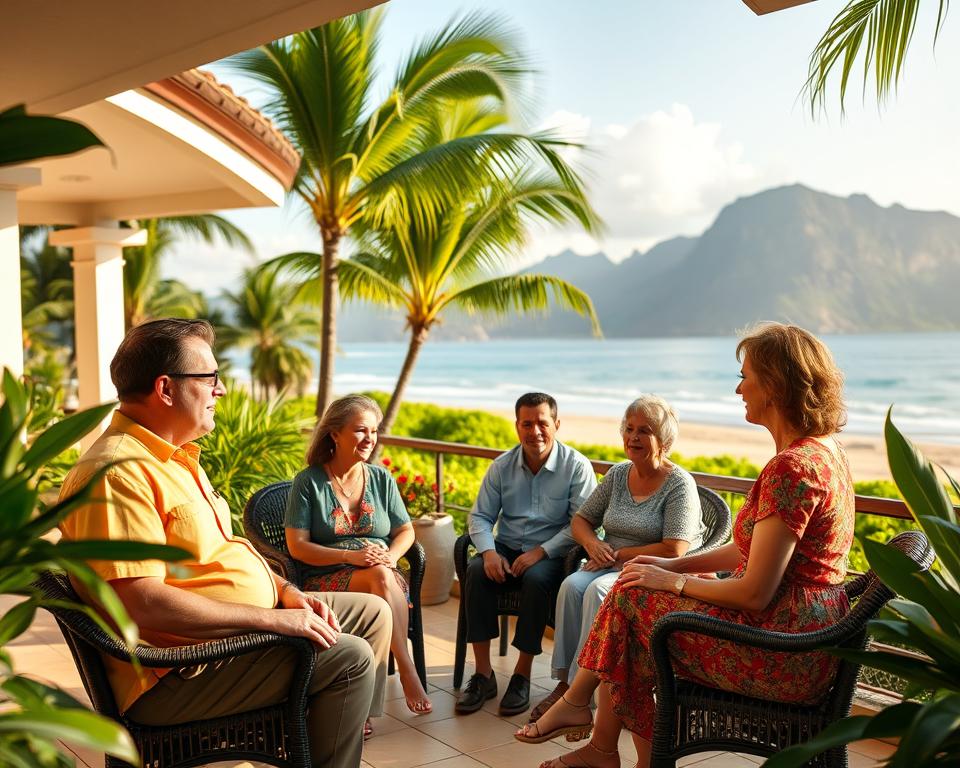Living in Costa Rica: Expat Guide & Tips
Ever thought about living in a tropical paradise and learning a new culture? Costa Rica attracts thousands of expats each year. It’s known for its stable democracy and stunning nature, making it a great place to start anew.
For expats, getting to know the local culture and understanding residency laws are key. They also explore the real estate market. Whether you love the Pura Vida lifestyle or prefer cities like Escazú and Santa Ana, Costa Rica has something for everyone. The real estate market offers options for all budgets, helping every expat find their dream home.

Key Takeaways
- Costa Rica offers multiple residency options including Pensionado, Rentista, and Inversionista, catering to different financial situations.
- Monthly living costs in Costa Rica can be budget-friendly, with couples managing around $2,200 comfortably.
- Rent prices vary significantly, providing opportunities for both budget-friendly and luxurious living spaces.
- The country’s healthcare system is cost-effective compared to the U.S., making it a safe choice for expats.
- High levels of biodiversity and low crime rates make Costa Rica a haven for nature lovers.
Understanding Costa Rican Culture and Lifestyle
The Costa Rica lifestyle is shaped by its rich culture and the Pura Vida philosophy. This philosophy promotes a simple life and appreciating nature. Over 120,000 U.S. migrants live here, making the expat community strong. They find that learning local customs makes their stay better, helping them connect and settle in.
Social Norms and Etiquette
Costa Rican culture values family, community, and traditional festivals. It encourages friendly interactions and genuine connections. Here are some common practices:
- Greeting with a handshake or a hug among friends.
- Respecting local traditions, specially during national holidays.
- Engaging in community events, such as neighborhood fairs and local markets.
These practices make Costa Rica welcoming to expats, helping them feel at home.
Pura Vida: Embracing the Laid-Back Lifestyle
The Pura Vida lifestyle is all about living easy while caring for the environment. Costa Rica protects over 25% of its land. Expats enjoy outdoor activities like hiking and surfing. They also try local foods like gallo pinto and ceviche, which feature fresh ingredients.
Community Engagement and Expat Networks
The expat community in Costa Rica is lively, with many networks for newcomers. These networks share info on local events and resources. They help expats:
- Participate in sustainability projects.
- Join cultural celebrations, like the Virgin of Los Angeles Day.
- Make friends through local meet-ups.
By getting involved, expats can dive into Costa Rican culture and help their communities.
Legal Requirements for Expats: Residency and Visas
When moving to Costa Rica, knowing the legal rules for residency is key. There are many residency options for expats, each with its own needs and rules. Understanding these can help make settling in easier.
Types of Residency Options
Costa Rica has several residency options for expats, including:
- Pensionado Visa: Needs proof of a monthly pension of at least $1,000.
- Rentista Visa: Requires a guaranteed income of $2,500 monthly or a $60,000 bank deposit.
- Inversionista Visa: Needs a minimum investment of $150,000 in a local business or real estate.
- Family Link Residency: For parents of Costa Ricans or partners of Costa Rican citizens.
- Digital Nomad Visa: For remote workers with a minimum income of $3,000 monthly.
Costa Rica Visa Requirements
To get a visa for Costa Rica, you must meet certain requirements. You need health insurance and to provide income proof and ID. The Investor Residency requires a big investment in local projects.
How to Apply for Residency
Getting residency in Costa Rica involves several steps. Here’s what to do:
- Choose the right residency category for you.
- Collect all needed documents, like income proof and health insurance.
- Send your application to the Costa Rican immigration office.
- Be ready for a wait of 9 to 24 months.
Getting help from a professional can make the application process easier. Remember, temporary residency lets you own businesses but not work for others. Knowing these rules helps you smoothly move to Costa Rica. Plus, living costs are often lower than in Western countries, making it attractive for expats. For more on costs, see this resource.
Live in Costa Rica: Navigating Cost of Living and Real Estate
Costa Rica’s real estate market is key for expats thinking of moving here. The cost of living in Costa Rica is often lower than in North America and Europe. This makes it attractive for those living abroad in Costa Rica. By looking at rental prices and monthly costs, newcomers can understand their finances better.
Understanding Rental Prices and Real Estate Market
Rental prices in Costa Rica vary a lot. They depend on where you are, the type of place, and what it offers. For example:
- Smaller apartments might start around $500 per month.
- Luxury accommodations can reach up to $2,500.
- Central Valley and Guanacaste are prime areas with many real estate options.
Expats often like homes in Escazú, Tamarindo, and Atenas. These places are known for their lively communities and facilities. They are among the best places to live in Costa Rica.
Average Monthly Costs and Budgeting Tips
The cost of living in Costa Rica can vary a lot. Here’s a quick look:
- A tight budget can start at about $1,100.
- Middle-class status can be achieved with $1,500 to $2,500 a month, which allows for additional luxuries.
- A comfortable lifestyle with dining out and activities might require $2,500 to $4,000 monthly.
- Families may find their costs rising to $5,000 to $7,500+ due to private schooling expenses.
Expats should check out local markets for cheaper groceries. Eating out less can also help save money. Joining a community can lead to shared experiences and cost savings.
Best Places to Live in Costa Rica
Several regions are the best places to live in Costa Rica. Each offers different lifestyles, amenities, and experiences:
- Escazú: Known for its upscale living and expat community.
- Tamarindo: A beach town popular among surfers and socialites.
- Atenas: Offers a relaxed atmosphere often cited for its friendly locals.
- Jaco: A bustling beach destination perfect for those who enjoy nightlife.
Those interested in moving to Costa Rica can find more on real estate and community on where to live in Costa Rica for.
Healthcare, Safety, and Lifestyle Tips for Expats
Costa Rica is known for its excellent healthcare system, ranking in the top 20 worldwide. The public healthcare, Caja Costarricense de Seguro Social (CCSS), is both accessible and affordable. It offers quality care at low costs.
It’s wise to also look into private healthcare. Private options have better technology and shorter wait times. Places like Clínica Bíblica and CIMA Hospital have high standards and cater to expats with bilingual staff.

Healthcare System in Costa Rica
In Costa Rica, the healthcare system is funded by both employers and employees. Employers pay 14%, and employees pay 9.34% of their salaries to the CCSS. Self-employed people pay between 10.5% and 18%.
Foreign residents usually spend 7% to 11% of their income on healthcare. Most expats pay around 57,000 CRC (about $100 USD) monthly. This is much cheaper than in the U.S., leading to big savings on medical costs.
Personal Safety Tips for Expats
Costa Rica is generally safe, but expats should stay alert and know their surroundings. It’s important to respect local customs and avoid isolated areas at night. Using reliable transportation is also key.
Connecting with the expat community can provide support and advice. It helps during the transition to living in Costa Rica. For more tips, check out personal safety tips for expats.
Conclusion
Living in Costa Rica offers a mix of natural beauty, cultural richness, and chances for expats. It’s home to over 5% of the world’s species and has 800 miles of coastline. The climate is warm, with temperatures between 70°F and 81°F all year. This makes outdoor activities like hiking and bird-watching a big part of daily life.
When moving to Costa Rica, you need to think about a few things. You should understand the residency options and manage your money well. The cost of living is generally lower, but prices for imported goods might go up. Still, the affordable healthcare is a big plus, making it easier to live here.
To really enjoy the Pura Vida lifestyle, learning Spanish and getting to know the locals is key. This will help you have a rich and memorable experience. Costa Rica is known for its stability and beauty. With the right preparation, living here can be incredibly rewarding.




